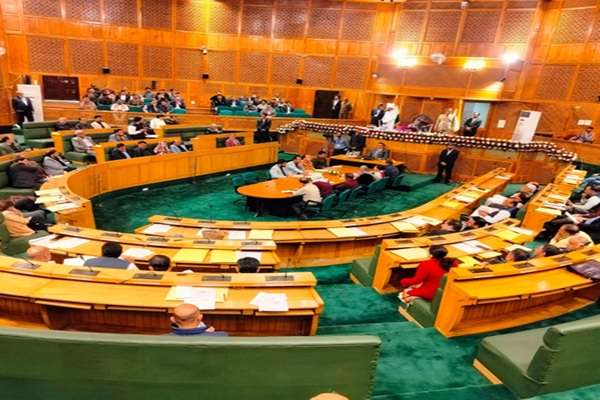Rifts, Betrayals & Power Shifts: Inside the Jammu and Kashmir Rajya Sabha Elections 2025
By: Javid Amin | 26 October 2025
A Defining Election in Post-Article 370 Jammu & Kashmir
The 2025 Rajya Sabha elections in Jammu and Kashmir were more than just a political contest — they were a litmus test for alliances, loyalty, and leadership in the Union Territory’s turbulent political landscape. What unfolded inside the Assembly hall was a blend of strategy, suspense, and silent rebellion that has left the corridors of power buzzing long after the votes were counted.
The results were clear but the implications complex: The National Conference (NC), led by Chief Minister Omar Abdullah, won three of the four Rajya Sabha seats, reaffirming its legislative strength. Yet, the Bharatiya Janata Party (BJP) managed to snatch one seat — an unexpected and symbolic victory, powered by what many call “cross-voting” and quiet betrayal within the Opposition bloc.
For a territory still defining its democratic identity after the abrogation of Article 370, the election revealed much more than numbers — it exposed fractures, alliances, and ambitions shaping the future of J&K politics.
The Numbers Behind the Narrative
| Seat | Winner | Party | Votes Secured | Runner-Up | Party | Margin |
|---|---|---|---|---|---|---|
| 1 | Choudhary Mohammad Ramzan | National Conference | 58 | Ali Mohammad Mir | BJP | 30 |
| 2 | Sajjad Ahmad Kichloo | National Conference | 57 | Rakesh Mahajan | BJP | 29 |
| 3 | G.S. (Shammi) Oberoi | National Conference | 31 | Imran Nabi Dar | NC | Internal Contest |
| 4 | Sat Paul Sharma | BJP | 32 | Imran Nabi Dar | NC | 1 vote |
A total of 86 out of 88 MLAs cast their votes — a remarkable turnout that reflected the high stakes of the contest. But the surprise wasn’t who voted — it was how they voted.
The Cross-Voting Conundrum
The BJP had 28 MLAs in the Assembly. Yet, its candidate Sat Paul Sharma secured 32 votes, four more than its strength — triggering an immediate wave of speculation and accusations.
Omar Abdullah, visibly composed but firm, addressed the media:
“All National Conference votes were accounted for. There was no cross-voting from our side. If discrepancies exist, they came from outside — from those who promised support and then broke it.”
The arithmetic was damning. Congress and PDP, which had publicly backed NC on three of the four seats, were suspected to have witnessed “strategic abstentions” or even “intentional invalid votes.”
Opposition unity — forged to keep BJP out — had cracked from within.
Inside the House: A Tense Vote and a Tense Silence
Observers describe the atmosphere inside the Assembly as “electric.” Each vote was not merely a ballot but a test of allegiance. Polling agents for both NC and BJP reportedly double-checked every count.
A detained MLA, Mehraj Malik, even cast his vote via postal ballot — a rare procedural occurrence that underscored how politically charged the election had become.
When results came in, jubilation mixed with unease. NC’s clean sweep was expected. The BJP’s seat, however, sent shockwaves through both camps. For the BJP, it was a symbolic breakthrough; for the NC and its allies, it was an embarrassment cloaked in silence.
Omar Abdullah: “Grateful to the Loyal, Disappointed by the Betrayal”
Omar Abdullah’s response struck a balance between grace and frustration.
“It’s not appropriate to name those who betrayed us. I’m grateful to those who stood firm, but disappointed by a few who let us down at the final stage,” he said at a press briefing.
He also hinted that some MLAs may have deliberately invalidated their ballots, subtly aiding the BJP candidate.
“Those responsible must put their hands up and own up,” he added — a statement widely interpreted as directed toward non-NC allies.
The message was clear: Omar wasn’t accusing his own; he was calling out the supposed allies — perhaps from Congress or PDP — who had broken ranks.
Congress & PDP: Allies Turned Liability?
In theory, the Congress and PDP were key to NC’s plan to secure all four seats. In practice, their coordination faltered. Congress skipped a joint strategy meeting just days before the vote — a signal of simmering frustration with NC’s unilateral approach.
The PDP, led by Mehbooba Mufti, had declared support for only three NC seats, not the fourth. The fourth seat, incidentally, was the one BJP eventually captured.
“Our support was conditional — tied to commitments on land rights and daily wage regularization,” a senior PDP leader told reporters off the record.
The alliance, forged on convenience and anti-BJP sentiment, lacked the glue of trust. The Rajya Sabha results exposed that fragility in the harshest possible way.
Dissent from Within: Ruhullah Mehdi & Mian Altaf Speak Out
If external cracks were visible, internal fissures soon erupted.
Two NC parliamentarians — Aga Ruhullah Mehdi and Mian Altaf Ahmad — publicly questioned Omar Abdullah’s leadership.
Ruhullah, never one to mince words, accused the leadership of “concealing the truth about cross-voting.”
“From Omar’s statement, it’s clear he knows who did the cross-voting but chooses not to reveal the names. That’s a betrayal of public trust,” he said.
Mian Altaf, a respected Gujjar leader, went further — criticizing the government’s “neglect of youth and unemployment.”
This rare public dissent within NC — a party known for discipline and hierarchy — signaled discontent beyond just electoral setbacks. For many within, the Rajya Sabha episode wasn’t just a vote gone wrong; it was a symptom of deeper unease about governance and leadership.
BJP’s Calculated Counterstrike
For the BJP, the election was an exercise in strategy, not dominance. Winning a single seat in a numerically adverse Assembly was no small feat.
BJP National General Secretary Tarun Chugh wasted no time in attacking Omar Abdullah’s administration.
“The NC’s manifesto is a bundle of lies. They have failed on every promise. Even their own MPs are rebelling,” Chugh said, demanding that NC release a “first-year report card.”
He further ridiculed Farooq Abdullah’s claim that Article 370 could be restored “within 100 years,” calling it an admission that “NC knows it will never return.”
The BJP’s messaging was sharp: even without numbers, it could expose the cracks in the opposition — and exploit them masterfully.
Autumn Session Chaos: Politics Spills into the Assembly
As if echoing the tensions of the Rajya Sabha polls, the Autumn Session of the J&K Legislative Assembly opened with uproar.
During an obituary reference to late Governor Satya Pal Malik, NC and BJP MLAs clashed over remarks labeling his tenure “controversial.”
Speaker Abdul Rahim Rather had to intervene multiple times to restore order.
The incident — minor on the surface — symbolized the raw emotions now defining the political discourse in Srinagar’s power corridors.
Veteran MLA Mohammad Yusuf Tarigami called for “constructive criticism even in remembrance,” while BJP’s Sham Lal Sharma countered that “obituary sessions are no place for political lectures.”
It was a reminder that in J&K, even moments of condolence could become battlegrounds for ideology.
Internal Math: The Numbers Don’t Lie
Here’s how the political arithmetic unfolded:
- NC: 41 MLAs
- Congress + PDP: 9 combined
- Independents supporting NC: 6
- BJP: 28 MLAs
Theoretically, this should have guaranteed NC all four seats. But cross-voting changed the equation. BJP’s final count — 32 votes — points to either four opposition MLAs defecting or multiple ballots being deliberately invalidated.
Either way, BJP walked away with a psychological victory — a crack in the “anti-BJP front” narrative that the NC had carefully built.
The Power Game Within NC
Beyond alliances, NC’s own internal dynamics are under the spotlight.
The loss of one seat exposed the undercurrents between Omar Abdullah’s modern, social media-savvy leadership and the old guard led by veterans like Mian Altaf.
While Omar projects pragmatism, some insiders feel the party’s traditional base — especially in rural constituencies — has been sidelined.
Political observers note that Aga Ruhullah Mehdi’s rebellion may not just be about transparency; it could be a signal of a deeper ideological tug-of-war within NC — between status-quoists and reformists.
The Strategy Behind BJP’s “One Seat Victory”
BJP’s single-seat win might appear modest, but it carries symbolic weight. The party leveraged precision strategy:
- Encouraging invalid votes among NC allies.
- Targeting disgruntled independents with promises of future backing.
- Turning a loss into a narrative win — “We broke the opposition’s unity.”
For BJP strategists, it was never about sweeping seats — it was about breaking momentum, undermining opposition credibility, and setting the tone for the 2026 Assembly elections.
Public Mood & Perception
Across Srinagar and Jammu, political chatter has centered less on who won, and more on who betrayed whom.
In cafes, university corridors, and media circles, the phrase “four votes” has become shorthand for the fragility of opposition unity.
A political analyst from Jammu University noted:
“The BJP doesn’t need major victories here. Every time the opposition turns on itself, it reinforces the BJP’s image as the only disciplined, goal-driven force in the region.”
Meanwhile, ordinary citizens express mixed feelings. Some admire NC for its majority wins, others question whether the party can hold its coalition together under mounting internal dissent.
What This Means for J&K Politics
The 2025 Rajya Sabha elections have redrawn the map of J&K politics in four major ways:
- Opposition Unity is Fragile:
Congress and PDP’s half-hearted alliance with NC is unlikely to survive the next big election without structural reform. - NC’s Leadership Faces a Stress Test:
Omar Abdullah’s charisma remains intact, but internal criticism could dent his authority if not addressed swiftly. - BJP Gains Ground Without Numbers:
The saffron party’s single-seat win is less about arithmetic and more about optics. It’s proof of infiltration and influence, even in hostile terrain. - Post-Article 370 Politics Is Now Fully Pragmatic:
Ideological lines blur when numbers matter. Every party is now playing the arithmetic game — loyalty is transactional, not emotional.
The Road Ahead: Bypolls and Beyond
With Assembly bypolls around the corner, each camp is recalibrating.
The NC must rebuild trust with Congress and PDP while quelling rebellion within.
The BJP, emboldened by its symbolic win, is already eyeing new entry points in the Valley through development narratives and targeted outreach.
For Omar Abdullah, the next few months will determine whether he consolidates his leadership — or becomes a caretaker in a divided house.
A Moment of Reckoning
In many ways, these Rajya Sabha elections were not just about four seats — they were a referendum on loyalty, transparency, and power-sharing in a post-UT J&K.
The betrayal of four votes might seem small, but its echo is loud — reverberating through alliances, ideologies, and leadership hierarchies.
As J&K braces for another cycle of political realignment, one thing is certain: the power games have only just begun.



